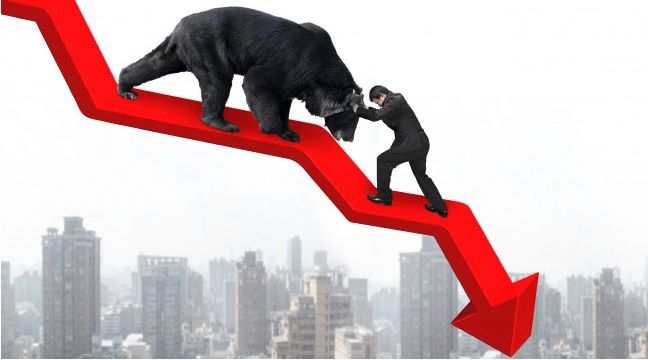We're Now Seeing How Fragile The System Is
LONDON — Ouch!
Last week the headlines were all about markets entering ‘corrections’ – that’s a 10% drop from the peak.
This week has barely started and already the talk is of bear markets (defined by many as a 20% drop from the peak).
‘DAX Heads for Bear Market’ is one headline on Bloomberg today. The benchmark German stock index is a hair’s breadth from the 20% threshold at the time of writing.
Here in the UK the FTSE 100 opened nearly 3% down on where it closed on Friday. It’s down 15% from the peak.
China’s getting all the blame again. Even the state news agency Xinhua used the phrase “Black Monday”. The Shanghai Composite lost a whopping 8.5% in today’s trading – adding to the 11.5% it lost last week.
Weakness Exposed
As you might expect, the drama is meat and drink for bank analysts.
“Official headline growth vastly overstates actual economic growth,” says Societe Generale’s Wei Yao, adding that the growth in Chinese electricity consumption has collapsed.
But the problems aren’t contained to China, as the global selloff demonstrates.
“The fragility of this artificially manipulated financial system was exposed over the last couple of days of last week,” says Deutsche’s Jim Reid.
He goes on:
“We’ve long felt that the only thing preventing another financial crisis has been extraordinary central bank liquidity and general interventions from the global authorities which we still expect to continue for a long while yet. So when policy changes, risks arise.”
Reid has two policy changes in mind, one real, one potential.
The real one is China’s currency move two weeks ago, where it ended its peg to the dollar.
The potential policy change is the first US interest rate hike since 2006.
This has been trailed as possibly happening next month, although the likelihood of that seems to have receded. The market now puts it at around 34%, down from 54% a couple of weeks ago.
Higher Interest Rates “Would Be a Serious Error”
Adding his voice to the lobbying against a Federal Reserve rate hike is Larry Summers. The former US Treasury Secretary has polished his brass neck and penned a truly breath-taking piece for today’s Financial Times.
“Raising rates in the near future would be a serious error that would threaten all three of the Fed’s major objectives – price stability, full employment and financial stability,” he says.
Let’s look at these in turn.
On price stability, Summers points out that with inflation below 1% and the Fed targeting 2%, tightening policy makes no sense.
OK, fair enough. He has a point there.
On full employment he fears that “higher interest rates make holding on to cash more attractive than investing it”. Lower investment means fewer jobs.
I’m less convinced by this. There’s a counterargument, namely that what’s deterring investment is less the expected return relative to cash and more a sense of heightened uncertainty.
After all, would the Fed moving its target rate from sub-0.25% to, say, 0.5% make any difference at all to a business facing genuinely attractive investment opportunities?
Anyway, that’s not the brass-necked bit. This is:
There may have been a financial stability case for raising rates six or nine months ago, as low interest rates were encouraging investors to take more risks and businesses to borrow more money and engage in financial engineering. At the time, I believed that the economic costs of a rate increase exceeded the financial stability benefits, but there were grounds for concern.
There certainly were, Lawrence old chum.
Will There Ever Be a Time When Rates Go Up?
Summers is saying that, yes, low rates were stoking up trouble in the financial sector, but the economic costs of doing something about that would have been too great.
As if the economic and the financial were utterly divorced. As if a stock market bubble-and-burst carries minimal costs to the economy.
Central banks like the Fed fret about financial stability precisely because it impacts the economy. Financial instability makes it that much harder for businesses to make investment decisions.
You can boil the above down to this: yes, keeping rates low helped make the financial system less stable. Because of that we have to keep rates low.
Here’s a question: what if heightened financial instability is itself one of the reasons the economy looks too fragile to policymakers thinking of raising rates?
It’s not an outlandish idea. But by Summers’s reasoning it means rates can never go up. Low rates make the system unstable. The instability weighs on the economy. Rates remain low.
Repeat until crisis.
Until next time,
Ben Traynor
for The Daily Reckoning, U.K.
P.S. Be sure to sign up for The Daily Reckoning — a free and entertaining look at the world of finance and politics. The articles you find here on our website are only a snippet of what you receive in The Daily Reckoning email edition. Click here now to sign up for FREE to see what you’re missing.



Comments: